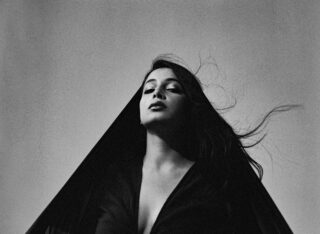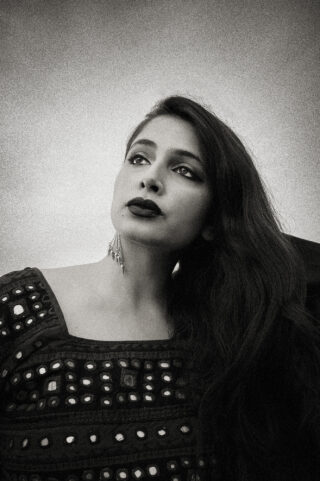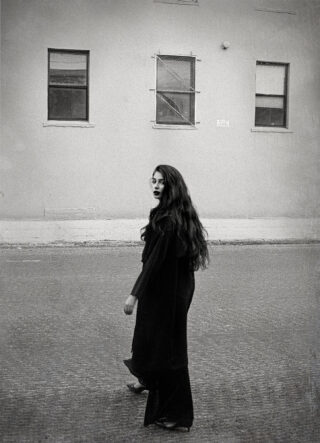Sheherazaad: “I knew that I wanted to write in Hindi and Urdu because that’s my ancestral language”
The artist who retrained her voice to honour her South Asian heritage

The artist who retrained her voice to honour her South Asian heritage
Sheherazaad is the epitome of the new generation of American artists who are reshaping the country’s musical and cultural landscape. Her forthcoming debut album, Qasr, produced by Arooj Aftab, is a celebration of her South Asian background; five minimal yet rich songs sung in Hindi and Urdu. “Growing up, it felt like the standard would always be the pretty, white, WASP family, blonde-haired, blue-eyed American girls in school who I always had in front of me in movies and listening to mainstream music – you would just see different versions of their faces,” she tells me from her place in the South Bay Area. “It was never in question that [this shift] would be the case. And it’s quite something. As much as I want to feel ecstatic about it, there’s still a lot of uncertainty.”
A native of San Francisco, before writing and recording Qasr, Sheherazaad embarked on a protracted journey to learn more about her identity, her ancestry, and her origins. “It’s fairly common with a lot of children who were born far from the motherland that their parents are from,” she says. “It manifests uniquely in every different community and culture. But a South Asian-American, diasporic sort of identity crisis is my specialty.”


She started singing at a very young age and went on to study American traditional music, while her parents introduced her to South Asian music. “They were hippies in the 1970s,” she says, “so they would go disco dancing and smoke weed. They listened to a lot of Carlos Santana, The Carpenters, Olivia Newton-John. I grew up listening to a lot of ’90s Bollywood music. So, there was more nuance, but that binary still holds to a degree. They call it the ‘third culture kids experience’: you feel like you’re occupying two different worlds, and there’s a split consciousness between your home and the outside planet. But as the world globalises and we all move around, I don’t know how much these stable, neat and tidy categories of identity mean anymore. I think I was more comfortable falling into that world of the in-between than panning hard left into things like English or American subgenres of art because I wasn’t being imposed upon.”
Sheherazaadfound her niche in this transitional place, crafting a flawless blend of South Asian traditional music and Western folk-pop, with songs written and performed in Hindi and Urdu. “I knew that I wanted to write in Hindi and Urdu because that’s my ancestral language and connects me to my roots; singing in the colonial language is an emotive choice,” she explains. “I had that American Idolsort of pedestal: a very specific type of voice I was deeply immersed in and working towards, but it didn’t feel authentic. I didn’t look like one of those people who’s ever going to get a chance of really being taken seriously doing that. It felt fraudulent, so I stopped singing for many years. Discovering the British South-Asian counterculture and meeting Arooj Aftab just moved me to start contributing to this new wave of music. And that’s when I moved out of New York and came back to California, which is kind of a Mecca of South-Asian classical music – [Indian tabla player] Zakir Hussein lives here, [Indian classical vocalist] Mahesh Kale,and my guru, Madhuvanti Bhide, who is a Hindustani classical musician originally from Pune, India.”

To find her authentic singing voice, Sheherazaadhad to completely remodel her voice. “Often in South Asian music, the female voices are extremely pitched up,” she tells me. “We sound like crazy cartoons. That has a lot to do with men controlling the engineering aspects of music as producers, writers and arrangers. They write things to suit the male range; I wanted to write stuff that really encapsulated this lost identity as women. I feel that we are so weird, so twisted, and so connected. I had never heard that in Hindi music.” Withher voice being her medium, this makeover sends a powerful political message. “It was kind of a process of, I would say, decolonising. It’s something that many of us are going through out here and everywhere, and it’s such an interesting act to recalibrate the voice. The voice is so sensitive, so intimate, so emotional, and so personal – more than possibly any other instrument that a person can play.”
And helping her achieve her unique sound is producer and neo-sufi pioneer Arooj Aftab, with a huge group of Arab and South Asian musicians. “I’ve noticed there is a very emergent solidarity between artists from those parts of the world; we have a shared sonic heritage,” says Sheherazaad. “Much of Indian music is influenced by music from the Arab world. There is pure musical synchronicity and synergy.Out here in the white gaze, we are all the same.”
Photography by Zayira Ray